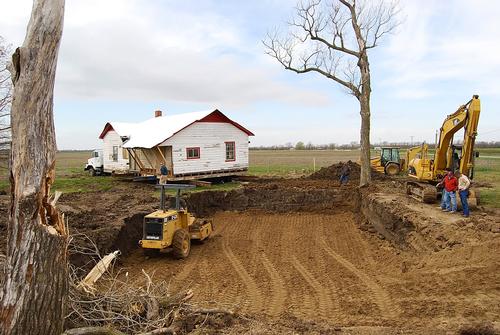see all jobs
Johnny Cash's boyhood home restored as part of US$3.2m historical development
Johnny Cash's boyhood home has been renovated as part of a US$3.2m (£2m, €2.5m) historical restoration programme in the Dyess Colony, Arkansas.
Dyess was an agricultural resettlement community during the New Deal era in the 1930s. It was one of President Roosevelt's projects to get out-of-work farmers back on their feet. The government acquired 16,000 acres of land and 500 out-of-work colonist families were recruited to live and work on the land, paying back the government from their crop proceeds. Cash's parents were among those recruited and he moved to the area when he was three-years-old.
The plans - which have been projected to generate revenue of US$10m (£6.5m, €7.6m) for Dyess and the northeast Arkansas area - will see the Cash house restored, cinema rebuilt and transformed into a visitor centre and the Co-op store rebuilt. The existing administration building will also be converted to house a museum with exhibits looking at the history of the Dyess Colony.
The project - a collaboration between the City of Dyess, Arkansas State University and The National Trust for Historic Preservation - is expected to open in the first quarter of 2014.
Dr. Ruth Hawkins - director of Arkansas Heritage Sites and Arkansas State University is in charge of acquiring, developing and operating sites of historic significance in the state on behalf of Arkansas State University. In addition to the Dyess project, Hawkins oversees the Hemmingway-Pfeiffer museum in Piffot, the Southern Tennant Farmers museum in Tyronso and the Lake Port Plantation in southeast Arkansas.
US$1.7m (£1m, €1.25m) has been raised towards costs of US$3.2m after receiving three grants totalling US$1m (£653,000, €765,000), US$300,000 (£196,000, €229,500) from the Johnny Cash music festival and an additional grant of US$100,000 (£65,300 €76,500) from the National Endowment for the Humanities, in addition to other private contributions.
A projected 50,000 people are expected to visit the attraction, giving Dyess - which only has a population of 515 people - a major economic boost, while creating 100 new jobs.
More News
- News by sector (all)
- All news
- Fitness
- Personal trainer
- Sport
- Spa
- Swimming
- Hospitality
- Entertainment & Gaming
- Commercial Leisure
- Property
- Architecture
- Design
- Tourism
- Travel
- Attractions
- Theme & Water Parks
- Arts & Culture
- Heritage & Museums
- Parks & Countryside
- Sales & Marketing
- Public Sector
- Training
- People
- Executive
- Apprenticeships
- Suppliers
















































